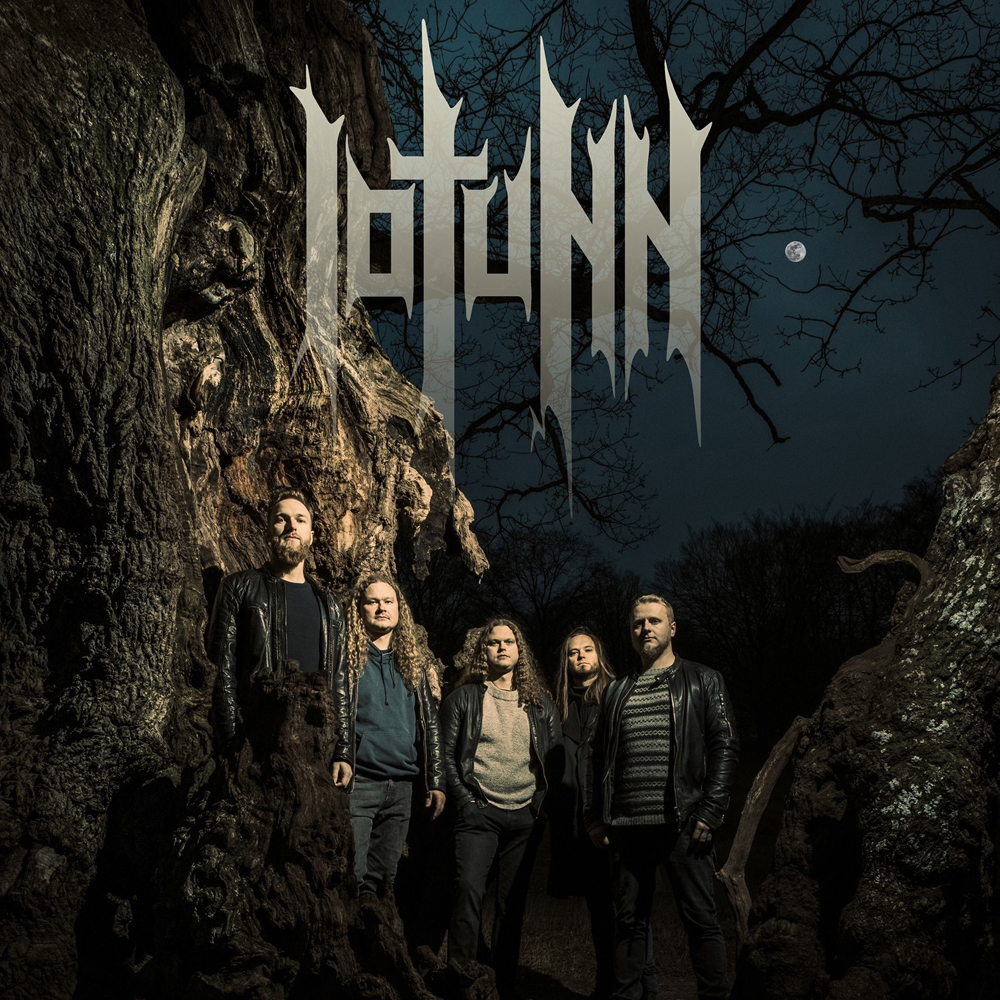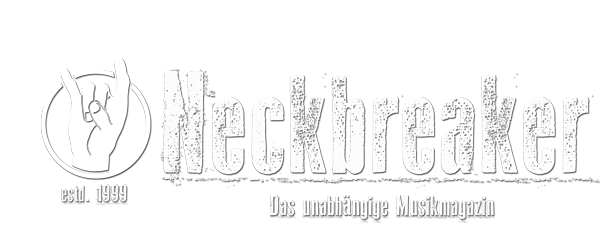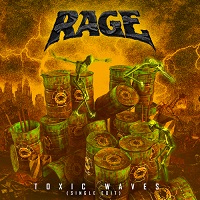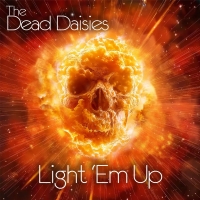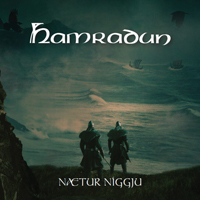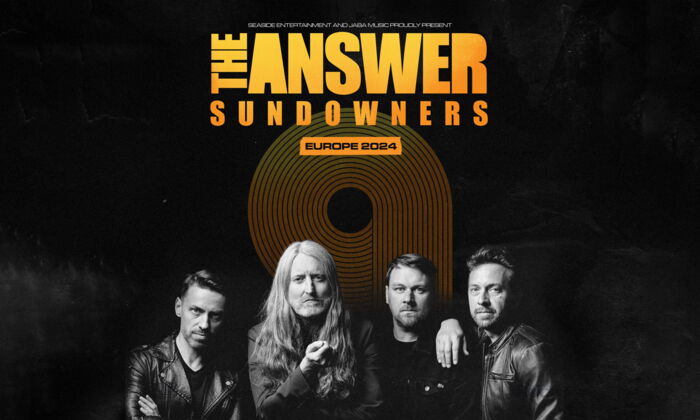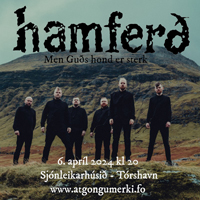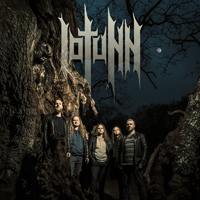 I was only expecting good when I heard the IOTUNN debut album for the first time, but I was blown away by how much I really liked and enjoyed it. But I am also a busy woman and when the label asked me if I want to do an interview with the band as well, my initial reaction was “Nah man, ain’t nobody got time for this!”, but what I wrote was “Let me think about it, maybe I can fit it in my schedule.” And well, after some thinking about it, I felt more and more the need to do an interview. And being able to do it with Jón Aldará, the singer of the band, felt even better. We haven’t met for more than a year now (thank you, Corona) but thanks to the brave new world of video chatting it was possible to have a nice chat and see each other. So Jón and I sat down on the Saturday after the album release to talk about the IOTUNN album “Access All Worlds”, what motivated him to join yet another band, what inspired him, the perfect soundtrack to the current Mars missions, the relationship between Danes and Faroese and of course birds. But read yourself:
I was only expecting good when I heard the IOTUNN debut album for the first time, but I was blown away by how much I really liked and enjoyed it. But I am also a busy woman and when the label asked me if I want to do an interview with the band as well, my initial reaction was “Nah man, ain’t nobody got time for this!”, but what I wrote was “Let me think about it, maybe I can fit it in my schedule.” And well, after some thinking about it, I felt more and more the need to do an interview. And being able to do it with Jón Aldará, the singer of the band, felt even better. We haven’t met for more than a year now (thank you, Corona) but thanks to the brave new world of video chatting it was possible to have a nice chat and see each other. So Jón and I sat down on the Saturday after the album release to talk about the IOTUNN album “Access All Worlds”, what motivated him to join yet another band, what inspired him, the perfect soundtrack to the current Mars missions, the relationship between Danes and Faroese and of course birds. But read yourself:
Anne: Congratulations to your album and the many positive feedbacks you have gotten so far! I have to admit that my expectations were pretty high because I know you wouldn’t join a band that doesn’t have a certain grade of quality and also your musical taste and mine are quite similar and so it’s not very likely you would join a band that I would not like. So I had high expectations but I was really blown away by how good it is. And I guess you were pleased to receive all those positive reviews and opinions so far.
Jón: Yes, totally. And yours, too.
Anne: Did you even get any negative reviews yet?
Jón: Not really. Not negative. I haven’t seen any negative so far, it’s been mostly positive to very positive. There has of course been a lot of grades or ratings. A lot of the ratings have been somewhere around 8 or 9 out of 10, and then some 10 out of 10. And then we have something strange, like I think Deaf Forever uses a 15 scale which was also really good, it was like 12 or 13 out of 15 or something like that and Metal Hammer is like 5 out of 7, something like that. So everything has been above average, I would say. And most of the reviews have been really good, so we’re all pretty overwhelmed by that, I have to say. It’s pretty strange also, because the album has been in our collective minds for so long. It’s been in development for so long and then also it’s around a year ago since we finished recording it, so you kind of get this strange relationship with the album where it’s not really new and then all of a sudden it kind of becomes new again when we see it through other people’s eyes and people describe how they feel listening to the album. And to see that people really get something positive out of the album - that kind of revitalizes it for us as well.
Anne: I think it’s quite funny to read the reviews because nearly every reviewer uses another genre to describe your music. I read Black Metal, Progressive, Melodic Death, Dark Metal, Doom and some more. I, personally, would go for Progressive because that’s a really big box and you can fit a lot of things into. What would you choose or do you even want to get placed in a specific genre or would you want to be put into a box?
Jón: Well, I think you make music that fits into what you like, typically, so I think we all like certain things that inspired the music that we write but it’s not like a conscious thing where we go. “Let’s do something that’s like this or like that”, and then afterwards we hear, “Oh yeah, I guess I was definitely inspired by this or that band when we wrote this”. But I think there are definitely some bands that are big influences and maybe on purpose I think I’m not going to mention them, but they have been mentioned in reviews and that makes sense. That they are big influences. But they’re also different enough and eclectic enough bands that it’s hard to associate our music directly or to say “this is a copy of this or that”. So I think it’s eclectic enough and complex enough influencewise that it’s difficult to really pinpoint. I would say that we are sort of in the Melodic Death Metal Progressive area, but saying that, by just naming those genres you couldn’t have all kinds of different types of music in your head, based on those genre tags, so I’d rather not put a genre on it. But I would say it makes a lot of sense what people have been saying about. I mean, even the people who are contradicting themselves, I think, are right. Or contradicting others. The people that are saying totally separate things, they are both right.
Anne: And what you mentioned about the bands, that is also quite funny in the reviews, because you’re getting compared to so many different bands. I read like ten different bands or even more. They say you sound like INSOMNIUM, like SCAR SYMMETRY, like DISSECTION, SANCTUARY, like THRESHOLD, like DIMMU BORGIR, and so many more…
Jón: Really, those bands, too?
Anne: Yes, BATHORY and DISILLUSION, PRIMORDIAL…
Jón: Yes, PRIMORDIAL, BATHORY, ENSLAVED I think, someone’s been saying. And maybe some of the Norwegians like BORKNAGAR and ARCTURUS I’ve heard, which are definitely bands that we all, or most of us, really love and so – some of it makes sense, other things I can’t really hear but I think it is fun, because all of those bands, pretty much all of those bands that people mention, are bands that I really like or respect. So, well, I mean if it’s a positive connection to a really good band, then sure, that’s fine.
Anne: When and how did you become a member of the band and at what stage of songwriting for the album have the others been at that time?
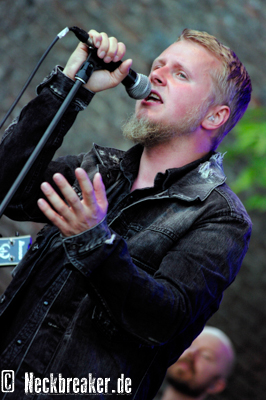 Jón: I think it was in the winter of 2018/19, when I started joining the working process of the album but by then pretty much most of the material was already written. The song structures, the riffs and the soundscapes were all in place, so there needed to be some leading vocals that connected everything. But no lyrics had been written and no vocal melodies had really been written either. So I was just given free reign to just start writing my own way and my own idea of what the concepts should be and what the lyrics should be, based on the music I heard. The reason I joined was because they showed me the music they had written and it was really spectacular and I was like, “I actually want to try my hand at it and see if I can fit in this kind of musical landscape somehow.” Because it’s quite different from the other stuff that I’ve done. It’s not vastly different, it could be more different, it’s still in that kind of moody, atmospheric Nordic semi-progressive area which I worked on before. But it’s still different enough that I wanted to try and so I just started making melodies and finding out how to arrange the vocals within the songs and that was really, really fun. And even though time was a little bit of a factor - it was difficult to find the proper time with my work and other band and stuff. It was a bit of a difficult decision to make. To say “Ok, I’m actually going to join another band”, and you know, “This has to be really good if I’m going to dedicate my non-existent time for it.” But I thought it was and fortunately it was really fun working on it. And the guys in the band were just so passionate and enthusiastic and talented as well and that’s kind of inspiring, too. So that’s what kept me in the process all the time. That they were so involving. But it took about a year to really both write things and record the vocals and also to make small adjustments. When the vocals come you start to see the song in a different way and then you think “Ok, maybe we can change this and that, to better fit the vocal arrangements and everything”. You have to be flexible with all the instruments, so they flow together perfectly. So there were a lot of adjustments throughout 2019 and then early 2020 we could finally start mixing.
Jón: I think it was in the winter of 2018/19, when I started joining the working process of the album but by then pretty much most of the material was already written. The song structures, the riffs and the soundscapes were all in place, so there needed to be some leading vocals that connected everything. But no lyrics had been written and no vocal melodies had really been written either. So I was just given free reign to just start writing my own way and my own idea of what the concepts should be and what the lyrics should be, based on the music I heard. The reason I joined was because they showed me the music they had written and it was really spectacular and I was like, “I actually want to try my hand at it and see if I can fit in this kind of musical landscape somehow.” Because it’s quite different from the other stuff that I’ve done. It’s not vastly different, it could be more different, it’s still in that kind of moody, atmospheric Nordic semi-progressive area which I worked on before. But it’s still different enough that I wanted to try and so I just started making melodies and finding out how to arrange the vocals within the songs and that was really, really fun. And even though time was a little bit of a factor - it was difficult to find the proper time with my work and other band and stuff. It was a bit of a difficult decision to make. To say “Ok, I’m actually going to join another band”, and you know, “This has to be really good if I’m going to dedicate my non-existent time for it.” But I thought it was and fortunately it was really fun working on it. And the guys in the band were just so passionate and enthusiastic and talented as well and that’s kind of inspiring, too. So that’s what kept me in the process all the time. That they were so involving. But it took about a year to really both write things and record the vocals and also to make small adjustments. When the vocals come you start to see the song in a different way and then you think “Ok, maybe we can change this and that, to better fit the vocal arrangements and everything”. You have to be flexible with all the instruments, so they flow together perfectly. So there were a lot of adjustments throughout 2019 and then early 2020 we could finally start mixing.
Anne: Do you think this writing process will change a bit, now that you are a complete band, for the next album?
Jón: Yes. Yes, I think so. Of course, our bassist, Eskil, he joined the band even later than I did, so pretty much all of the vocals and the songs were written when he was asked to lay down some bassparts. Otherwise it was Jens Nicolai Gräs, the guitarist, who recorded the bass, but we all kind of thought “You know what? It would have been raised to an entirely new level to have an actual proper bassist making proper bass arrangements that don’t sound like a guitar.” And Eskil is crazy talented, both technically and creatively, when it comes to groove and everything so it really, really elevated the whole album that he was able to join and then also create his own bass arrangements within the songs. I was really surprised to see that that could be done in such a way. Typically, the position of bass in metal is very often resigned to providing the oomph, the power and just kind of following the guitar lines as much as possible, but Eskil went in a totally different direction, which is fantastic. So…yeah, what was your original question by the way?
Anne: I was asking if your writing process will change in the future, now that you are a complete band.
Jón: Yes, exactly. So you know, that is kind of an odd thing. The bassist coming in so late. Me coming in so late. So I think there will definitely be some changes, we will be able to follow the process from an earlier point. There will still be Jesper and Jens Nicolai, the guitar brothers, they write a lot of stuff, they’re very, very prolific when it comes to writing material and a lot of it is really, really crazy good. So we can’t really follow that so much. So they are creating the songs for us to continue arranging afterwards. So that is going to be the process I think. But now we can actually join in that early stage of writing the songs and say: “You know, I have a vocal line that would fit in better if we did it this way.” Basswise I think we could arrange the guitars and the bass around each other a bit closer and stuff so it’s definitely going to be maybe more a holistic and complete way of writing and arranging. So it’s going to be interesting to see how that will affect the next record. But then again the next record is pretty much already written. And the third one is almost on the way. I mean, they’re writing so much. So there is no shortage of material but that doesn’t really mean that we can use and slap it all together and put it out. It takes a lot of work to get the album to make sense and everything but we’re definitely already well on the way with the second album.
Anne: Corona has been and still is a challenge for the whole music scene, but did it complicate working for you together or does it maybe make it even easier, as there are barely any things that could disturb or distract from the working process like nobody has concerts, tours or private holidays?
Jón: Hm. I think as we were able to actually record and mix the album just before Corona hit, there were no real restrictions. I mean, if we had started a year later on the album, we would have not been able to do the process the way we did. Because what we did was: I flew every month from the Faroes to Denmark to work on vocals in Copenhagen and record them, which was a lot of trips. A lot of traveling. All through 2019. Basically from January to December or even January or February of 2020. And then Corona hit, when was it? Was it like late February when it started being serious? Around these parts at least, and we just finished mixing the album then. So it’s sort of ok. The album is done, now we can start shopping for record labels and stuff like that. So Corona hadn’t really affected us in any way. The only way I would say it affected us, is now. Around the arrangements around the album release. Because we had planned an album release concert and some follow-up gigging and touring. But now it’s finally starting to interrupt the flow of the album release and stuff like that. We had a few concerts lined up last year, which were of course cancelled, almost prompt but not a huge amount. This is kind of… this is a little bit worse. You know, every other band is dealing with this, so we can’t really say we were special in this regard. But I don’t think it has done anything necessarily positive for us either, really. It’s just, we had the whole album and all the package ready before shopping for records labels so we were prepared for a period of just finding the correct setup to release the album and so everything has been following the plan more or less. Until now.
“I think the album will be a pretty nice soundtrack for people following these Mars exploration missions”
Anne: But I mean, you said you already started writing songs for the second and third album, so does it have any influence on that work?
Jón: Hm, yes, that’s quite a possibility. We just released this one, so I think the work on the second album is continuous – we’re not entirely sure how much time it’s going to take us to get somewhere. I think there is a plan to do some recording already this year, but I have the HAMFERÐ album to focus on now. So I will not be joining the writing process for the second album of IOTUNN right away. It’s going to be a little bit slow for me because it’s both albums at the same time. So we’ll have to see and also we are kind of hoping, maybe expecting, that there will be less Corona interference after summer when all of the vaccines have been administered in most of the western world, I guess. So maybe the grip of Covid-19 will start to loosen later this year and then maybe we will be free to do as usual. But, you know, you can only hope.
Anne: Yes. Are you the only one responsible for the lyrics or do the others add ideas as well?
Jón: Mostly. I would say 99%. And then I discuss them with the others and if the others may have some interesting input I’m always open and sometimes it gets used and sometimes I’m just being a dictator and saying “No, you know what, I’m the one who decides!” [laughs]. No, I’m just kidding. It’s pretty relaxed and I’m pretty much given the full control of that aspect, but always open for ideas. So, yeah, a little bit of input both lyrically and vocal arrangement-wise, but musically there has been a lot of input from the other guys, about arranging the vocals, creating melodies and stuff like that. So that’s been more of a collaboration process. Lyrics were mostly mine, yes.
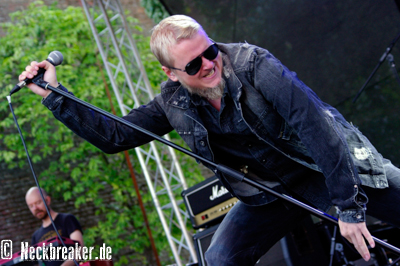 Anne: Can you tell a bit about the story of this album and what it is about?
Anne: Can you tell a bit about the story of this album and what it is about?
Jón: In very simple terms it’s about a crew of space travelers on bord an exploration ship called the Garganey I. They are leaving Earth, which is sort of a derelict, dystopian future world, where humanity is hanging on to deal life and it’s not very livable anymore. So they set out to search for other planets where humanity can continue to exist. So that’s the basic background for the story. And then they - it’s very thematic in a way. It’s philosophizing a little bit about the place of humanity in the universe and what do we add to existence, are we kind of the center of existence? Do we need to continue as a race? Can we continue as a race in other parts of the universe? Can we continue to exist without some of the things that we think are necessary from the Earth? And stuff like that. So they are visiting different planets and testing out, finding kind of alien beings that are living in totally different ways than humans are and trying to figure out “Can we live this way? Is this any life for us?” So there is a lot of this, the soul of humanity, what do we need? Not just to survive, but to exist meaningfully. So they visit these different types of planets, that are not really habitable and then, in the end, they do find this kind of paradise system of planets where everything seems like a Utopia, like a perfect paradise for man to maybe exist, but they have a problem: They can choose either to stay there themselves and continue humanity or they can use the technology of the spaceship to return to Earth and let people know of this. And try to save the rest of humanity. But that technology has never been tested before. So they don’t really know whether that will doom them or help them save the rest of humanity. So it’s kind of a dilemma at the end there. That’s how it ends.
Anne: How did you get the idea for the lyrics or for the whole theme and what was your inspiration?
Jón: That’s a good question. It just kind of came into being. I listened to the music and I wanted to make something spacey and the music gave me a feeling of soaring through space in an almost mythical way. A kind of strange feeling. Some of the music is a little bit psychedelic in a way and atmospheric in that way so we all agreed that it would be really cool to have this kind of strange, philosophical journey through space. So I just started to work from there. Really mostly just from a visual aspect and then I thought “Ok, this will be a pretty cool framework for the lyrics”, that both explore these big themes of our place in the universe, but also of the people on board who are uncertain and afraid and excited, all at the same time. Going through different emotions while encountering planets and new things and also hopelessness and doubt about… Is there any point in this at all? That kind of thing. So there is a lot of big emotions going through and I really like that, you know. And I think that fits really well to the music. I think it just sprang from listening to the music that the Gräs brothers had written earlier.
Anne: How much Jón, the natural scientist and how much Jón, the poet is in the lyrics?
Jón [laughs]: That’s a good question. I think mostly the poet, which is often that aspect that I invoke when it comes to music, but, you know, somewhat informed by the natural scientist in a way. Of course, I’m a biologist, and so I had imagined these different kinds of existing outside of Earth, where beings would somehow exist. Sometimes in total chaos, constant chaos, sometimes without a proper biosphere, maybe only in dirt and with very, very, very restricted resources with machinery kind of doing most of the work. So definitely that part of my life inspired some of those aspects. And of course the general idea of meaning in the universe which – I think science informs in a lot of ways. So, that part of me is not completely absent from the concept, no.
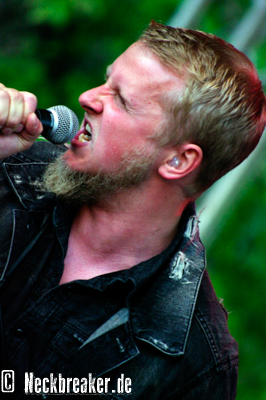 Anne: The opening song is the “The Voyage Of The Garganey I”. Will we hear of the Garganey II in the future?
Anne: The opening song is the “The Voyage Of The Garganey I”. Will we hear of the Garganey II in the future?
Jón: [laughs]: The Garganey II! Well, that’s a good question actually. Because… will there be a Garganey II? The Garganey I is the spaceship and there is only one ever made at that point and I think we might go a bit of a different route next time. We go a route where we won’t need a spaceship, I think. Probably. But you never know actually. You never know. It’s not completely set in stone. But we’re thinking about doing something more earthbound next time, more kind of old, something that springs from within the Earth somehow. But I definitely have an interest in connecting it to this first album, so let’s see if there will be any references to the Garganey II. Let’s see.
Anne: With the official release yesterday you missed the Mars landing by just around one week. And there are three Mars missions this month. So was this a nice coincidence or was it planned to release the album in this month?
Jón [laughs]: Yes, it was planned to release it this month, but it’s kind of a fun coincidence, I would say. I think we should have maybe made a bigger spectacle out of it, trying to connect it a little bit better, but you know what? I think the album will be a pretty nice soundtrack for people following these Mars exploration missions. Reading articles about it, and watching pictures from Mars and then listening to the music, I think it would fit perfectly, to be honest.
Anne: When you read or hear the word “Garganey” it first sounds a bit like something from a Russian space program, but actually it’s the name of a duck that migrates over very long distances. So is this some sort of an earthly aspect of the theme?
Jón: Yes. Yes, it is. It’s this interesting species of duck, because it’s both really beautiful and unspectacular at the same time. And it’s an overlooked kind of species. It’s easily overlooked, because it’s a small, brownish duck when seen on the surface level which I thought was kind of cool, because it’s definitely its very own thing, its own species that has its own life history and everything so it represents a unique thing that goes under the radar in a way. Somehow I thought that would be very fitting for the spaceship name, somehow inspiring the spaceship. Nothing that spectacular, but still something really unique. And of course the migrating part definitely fits well with going far into the universe. And of course the reference to nature and biology and that sort of stuff that grounds the spaceship in something earthly and real.
Anne: I think there is also a bird on the cover and also in the video to “Weaver Systems” you can see birds. So what role do birds play in this space voyage?
Jón [laughs]: Well, I think they have always been a symbol of freedom for people. It’s this sort of freedom to move through three-dimensional space while all of us earthbound creatures are cursed to wander two-dimensionally mostly [laughs]. So there is something really inspiring about birds in general and how they are able to live completely different than we do. And use both air and land and often also sea and water to their advantage, so, yeah, it’s a symbol of freedom, and I think that’s also the idea of the album in a way. To in some ways find us a save space where humanity can be free to continue on and stuff like that. It’s these general ideas about freedom I think.
Anne: I think in general that the lyrical concept can be seen as well as traveling between worlds and as traveling the human life. What are your thoughts about that?
Jón: Oh yes. Definitely, yes. That’s where I am with, that it basically connects the inner world with the outer world in a way that we think is pretty interesting. That we live both inside ourselves and outside ourselves and we see the big perspective but we are also kind of at the same time lost in our own particular perspective. So that’s - I would say duality - but it’s also a bit of a paradox that we seek to find the big solutions, like huge connections between groups of people and then we always have our own personal agendas at the same time. And that is kind of a struggle between those aspects I think. Which is very interesting.
.
“You don't want to frustrate people or bore them unnecessarily.”
Anne: In the song discussion video for “The Tower Of Cosmic Nihility” Jens and Jesper say that the song originally was 18- 20 minutes long and then you stripped it down to 7:30 min. How do you proceed in such a case?
Jón: Oh, actually I don’t know. The version I have heard was pretty much that, finished one. But we definitely did shorten songs during the time that I worked on the album as well. It’s really important that you have a clear idea of what you’re doing with the song. And sometimes you can get carried away with following the ideas and where the song leads you almost to absurdity. And then you suddenly have a 20-minute-song in your hands. Maybe you get really attached to all the ideas separately, but if you listen to the whole song and you look at it you think, “you know what, I think this song would be stronger if we cut here and there and there” and then you try to find the core of the song. And then, if we need to build something extra to it, then we can do that afterwards but then it’s kind of zero in on what the song is saying and why… How long does it need to be? Does it need to be 20 minutes long? Or is it two or three different songs in there? It could be separate. So it’s pretty important, especially for the listener, I think. Other people that are supposed to get something out of your music. You don’t want to frustrate people and bore them unnecessarily. So that’s important work.
Anne: I heard you sing many times and on many releases but I have to admit that I was surprised to hear that you have become even better – in my opinion. I would even say this is your best singing performance I have heard so far and you also use some singing styles that I think I haven’t heard from you before, at least not in that extent, like in “Laihem’s Golden Pits” or in “Waves Below”. I think I never heard you sing that brutal.
Jón: Oh, thank you! Thank you very much! I’m really glad to hear you say that. And well, I used that style a little bit here and there. In a few spots in some HAMFERÐ songs I do use that. If you go back to the first EP of HAMFERÐ, to the song “Vráin”, there is a little bit of that in there and then also the song “Sinnisloysi” from the album “Evst” has as little bit of that. So I’ve always had a need to insert a little bit of this kind of semi-shouting voice which gives off a totally different vibe than growling and clean singing. I have a naturally sort of soft clean voice when I sing. It’s not super natural for me to put that kind of aggression into that as much but then I found that other way of singing and it seems to work especially on those two songs, “Laihem’s Golden Pits” and “Waves Below”. So I thought “Ok, let’s try this there”, because that is what I’m hearing, some sort of frustrated madman standing on top of a mountain shouting over this. But… yeah, I’m glad you noticed. [laughs].
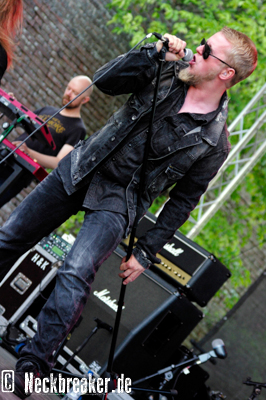 Anne: And now a technical question: What microphone are you using?
Anne: And now a technical question: What microphone are you using?
Jón [in a low voice]: Oh fuck [I heard that! - Anne]. We used a Shure SM7 I believe… yes, it was a Shure SM7.
Anne: So you used that for recording?
Jón: Yes. It’s Bjørn’s, the drummer’s, microphone. He is the one who engineered the album and recorded the whole album, and yes, that’s his microphone, a Shure SM7. Which was really nice, actually. I haven’t recorded with that one before. I always had kind of different mikes, never really have been settling on one specific thing, just whatever felt right in the studio and what was available. So I think that was pretty good.
Anne: Do you prefer a specific one for playing live?
Jón: I do have my own live mike, which is a KSM9, which is a live condenser mike, so it has some really, really cool qualities which also allows me to work with it a little bit more physically and also just sounds really great. It has a super clear and nice sound. So I’m really happy with that, I always use it when I’m gigging.
Anne: I really like the way you arranged the songs, like for example in “The Tower Of Cosmic Nihility”. I really like how the drums slowly come to the foreground and just before they become too much, they return more to the background again and leave room for the other instruments.
Jón: Yes, that’s Bjørns kind of vision of the songs, because he works all his drumming into the songs, he creates his own drum world, his own rhythmic world within the songs. So that’s all him. And it’s really amazing what he can, how good he is at creating these dynamics within the songs. He has a very unique drumming style, I think, which is not really necessarily super flashy as such, but it’s still quite fill-heavy and very doublebassy and stuff. It’s weirdly subtle as well. In that sense, I think. I haven’t actually consciously thought of that, but now that you mention it, that’s a really cool thing, yes.
Anne: I also really like how you found the perfect balance between atmospheric sounds and the really harsh parts.
Jón: Yes. That’s typically the guitars sounds. The Gräs brothers, they love to play really loud. Loud and rough. Raw. So that’s pretty much their guitar sound that really dominates the album a lot. And then, as you say, there’s these several effects and synths and guitar effects and stuff, that kind of spices everything up a little bit. It’s pretty subtle, but yes, I’m really happy with the balance between those things.
Anne: “Save Across The Endless Night” really sounds like it’s the essence of the album and contains more or less everything in it and even if you don’t get that from the lyrics, you get it from the music, which I think is pretty impressive.
Jón: Yes, that is not the first time I’ve heard that, actually and I think that makes a lot of sense. I think “Save Across The Endless Night” is probably the most varied song. So it seems a little bit like an overture in a way, I think.
Anne: I also really like sound and production, it’s very detailed and differentiated and you can figure out every single instrument and the sound is really good, pretty punchy. So many other albums, when you listen to them after your album, they sound a bit - empty. And I also think it has a really slightly early 2000s IN FLAMES touch which I think comes from Fredrik Nordström.
Jón: Yes, I totally love that. You know, a lot of the best productions – in my mind, they are what I associate with the best metal music - is late 90s production, typically Swedish. You know, there was a sound there that is so hard to imitate. And you have all these really, really great producers, Daniel Bergstrand and Fredrik Nordström and Peter Tägtgren, all the Swedish greats and even the older ones of course, Tomas Skogsberg, the guys who did the earlier Death Metal as well. Somehow it’s this kind of really cool history in Sweden of just knowing what to do with Metal soundwise. So I’m really happy with the decision to go to Fredrik Nordström to do this album because he really has this deep and larger than life powerful sound. And almost too much at some point, but it’s kind of …it fits the album I think.
Anne: I think you already answered my next question because that would have been “Do you already have ideas for the next album?” I think you have.
Jón: Well, yes, we pretty much have almost all the ideas for the next album.
Anne: And you are now officially singer in three bands, how many more do you want to join…
Jón: No more! No more! [laughs]
Anne: … and aren’t you afraid you’re getting into conflicts or running out of touring time?
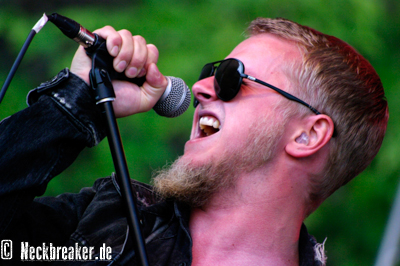 Jón: No, no, it’s impossible. But then again I would say, currently I’m in two active bands and BARREN EARTH is sleeping I would say. We’re all very busy with all our other stuff, the BARREN EARTH guys, so we’re all ok with BARREN EARTH sleeping now and who knows if that will awaken again, but yes, so it’s mostly IOTUNN and HAMFERÐ that’s filling up the schedule at the moment. And so far Corona has safely helped us avoid any scheduling conflicts [laughs], but let’s see what the future brings. I’m not a career musician and I’m a fulltime biologist and so it’s… I face those problems when they come, I think.
Jón: No, no, it’s impossible. But then again I would say, currently I’m in two active bands and BARREN EARTH is sleeping I would say. We’re all very busy with all our other stuff, the BARREN EARTH guys, so we’re all ok with BARREN EARTH sleeping now and who knows if that will awaken again, but yes, so it’s mostly IOTUNN and HAMFERÐ that’s filling up the schedule at the moment. And so far Corona has safely helped us avoid any scheduling conflicts [laughs], but let’s see what the future brings. I’m not a career musician and I’m a fulltime biologist and so it’s… I face those problems when they come, I think.
Anne: You’re now on the same label, with both bands, with HAMFERÐ and IOTUNN. Would it be possible to tour together or would two gigs per evening just be too much for you as a singer?
Jón: Yes! Yes, I think it would be too much. I have tried I think once to play at the same festival on the same day with BARREN EARTH and HAMFERÐ and it was doable, but it was not very easy. And I am kind of fearful of what a tour would do to me if I had to do two different gigs. And both bands are very physically demanding. Or at least my performance style is very physically demanding so I think it will be too much. So that is something that I want to avoid pretty much. Indefinitely.
Anne: Yes, it’s understandable. Are there even any touring plans as nobody can really plan anything right now?
Jón: Yes, we are working on plans. There is something that is in the works for next year, 2022. But nothing has been announced yet so I’m not going to say too much – you never know these days. But it’s definitely something that’s really already well developed. So all it really needs is the safety from lockdown and stuff like that. So I think this year there will maybe be some local gigs, small tours, like weekend tours, if we can get away with it. So that is what we have in preparation right now. But otherwise it’s just too unsafe to say anything more.
Anne: We’ve already reached my last question, it’s not completely serious, but how hard is it to be the only Faroese person in a full-danish band and do they treat you well?
Jón [laughs]: Strangely enough it’s really nice. But yes, it’s not unkown that the Faroese and the Danish have their sort of friendly quarrels, if you can call it that. Sort of a little bit of an antagonism due to our history and stuff like that and they’re kind of… we’re part of their kingdom and all of that but these guys in IOTUNN, they are so nice and so respectful and so intelligent kind of types, so it’s… they’re so undanish. No, no, I’m just kidding! Don’t say I said that [Of course I do – Anne]! No, they’re just really, really, really great people to be around and really inspiring people to be around, so it’s a pleasure, it really is.
Anne: And those were all my questions, I thank you very much for the interview, for taking your time.
Jòn: Yeah, sure.
